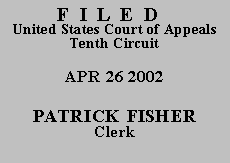

| UNITED STATES OF AMERICA,
Plaintiff - Appellee,
v.
ANTHONY GAULT Defendant - Appellant. |
No. 01-2120
(D.C. No. CIV-99-1135-JB/KBM, CR-95-229) (D. New Mexico) |
Adopting the magistrate judge's proposed findings and recommended disposition, the district court denied Mr. Gault's section 2255 motion, dismissed his action with prejudice, and denied his request for a certificate of appealability. This appeal followed, in which Mr. Gault asserts, first, that section 841 is facially unconstitutional and, further, that even if section 841 is valid, his conviction, or, at a minimum, his sentence, was erroneous under Apprendi v. New Jersey, 530 U.S. 466 (2000). Having reviewed the entire record, we deny Mr. Gault's request for a certificate of appealability and dismiss his appeal.
In his first argument on appeal, Mr. Gault relies on United States v. Buckland, 259 F.3d 1157 (9th Cir. 2001), and asks this Court to declare section 841(a) unconstitutional on its face. However, in United States v . Cernobyl, 255 F.3d 1215, 1218-19 (10th Cir. 2001) and United States v. James, 257 F.3d 1173, 1182-83 (10th Cir. 2001), we rejected similar arguments and specifically upheld the constitutionality of section 841. In each case, the respective petitioners urged this court to follow its pre-Apprendi interpretation of section 841(b) and hold that this statute contained the sentencing factors to be considered by the district court, as opposed to substantive elements of the offense charged. See id. Under this interpretation, section 841(b) would be unconstitutional post-Apprendi because it would leave to the court that which Apprendi held must be submitted to the jury. See id. We explained in Cernobyl:
At the heart of Cernobyl's argument is an assumption that we are bound by our pre-Apprendi holdings that drug quantity determinations under § 841(b)(1) are to be submitted to a judge for a finding by a preponderance of the evidence. Whatever force those cases may have had in the past, we are now bound by the Supreme Court's interpretation of the Due Process Clause in Apprendi itself. Apprendi compels us to submit to a jury questions of fact that may increase a defendant's exposure to penalties, regardless of whether that fact is labeled an element or a sentencing factor.
See Cernobyl, 255 F.3d at 1219.
Because this circuit has already interpreted section 841(b), post-Apprendi, as containing the elements of an offense, "[w]e are bound by the precedent of prior panels [of this court] absent en banc reconsideration or a superseding contrary decision by the Supreme Court." See James, 257 F.3d at 1183 (quoting In re Smith, 10 F.3d 723, 724 (10th Cir. 1993) (per curium)). Consistent with this circuit's post- Apprendi decisions, in United States v. Buckland, 277 F.3d 1173, 1180-82 (2002) (en banc), the Ninth Circuit relied on our decision in Cernobyl to uphold the constitutionality of section 841(a), thus overturning the previous panel decision that Mr. Gault urged us to follow in his appellate brief.
Addressing the second issue raised in this appeal, we have held that although section 841(b) is constitutional on its face, a petitioner may challenge the constitutionality of its application to the facts of the petitioner's case. See James, 257 F. 3d at 1183. As to Mr. Gault, the district court found that "the indictment alleged a specific amount of drugs (one kilogram or more of PCP), penalty section 841(b)(1)(A), and Defendant's sentence in any event fell within the twenty-year maximum imposed by penalty section 841(b)(1)(C)." App. vol. I, doc. 17 at 2. Even assuming Apprendi is retroactively applicable to a first habeas petition, which this court has not decided, the district court correctly observed that Apprendi was not violated here.
For the foregoing reasons, Petitioner has failed to make the requisite showing under 28 U.S.C. § 2253(c) for the issuance of a certificate of appealability.(1) Accordingly, we DENY Mr. Gault's request for a certificate of appealability and DISMISS his appeal.
ENTERED FOR THE COURT
Stephanie K. Seymour
Circuit Judge
*.After examining appellant's brief and the appellate record, this panel has determined unanimously that oral argument would not materially assist the determination of this appeal. See Fed. R. App. P. 34(a)(2) and 10th Cir. R. 34.1(G). The case is therefore submitted without oral argument. This order and judgment is not binding precedent, except under the doctrines of law of the case, res judicata, or collateral estoppel. The court generally disfavors the citation of orders and judgments; nevertheless, an order and judgment may be cited under the terms and conditions of 10th Cir. R. 36.3.
1. Mr. Gault's motion for leave to proceed on appeal in forma pauperis is denied.